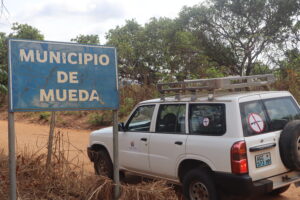Conflict incidents in Mozambique have continued to rise year on year, and the ongoing conflict in Cabo Delgado has significantly worsened the humanitarian situation in the region. Whereas in previous years, we would normally see a decrease in incidents during year, INSO recorded a rise in OAG activity in Cabo Delgado in February and March. Violence and instability have forced many to flee their homes, over 50% of which are children. NGOs face considerable challenges in delivering aid due to the volatile security environment limiting access to affected areas. Despite the difficult circumstances NGOs continue to strive to meet the needs of the population in Mozambique.
One such NGO is the Fundação Ariel Contra o SIDA Pediátrico (Fundação Ariel) a a National NGO founded in 2011, the Fundação Ariel has been working towards eliminating paediatric HIV in Mozambique. They implement programs across Maputo Province and Cabo Delgado, acting as the clinical implementation partner for programs within the Centre for Disease Control and the Ministry of Health. So far, they have supported over 100 health units and ensured over 1 million children can access testing for HIV. However, navigating the complex security landscape in Cabo Delgado has proven to be a daunting task.
“Before partnering with INSO, we faced many challenges in safety and access,” Jeremias Pitas, Emergency Coordinator from the Fundação Ariel explains. For NGOs like the Fundação Ariel, accurate, timely and reliable information is crucial—not only for delivering aid but for ensuring staff safety in doing so.
Globally INSO supports over 600 national NGOs in 22 of the highest risk humanitarian contexts, ensuring they can operate effectively and safely in challenging environments.
One of the biggest challenges for many NGOs, whether international or national, is often finding accurate and timely information to inform their programming and security risk measures. To meet these challenges INSO is constantly innovating how to capture and share information that will impact humanitarians on the ground.
From our Conflict and Humanitarian Data Centre, to flash alerts and reports, to our safety roundtables, we provide a variety of ways for NGOs to consume critical information. For the Fundação Ariel “security information is key for our teams in the field… we cannot access our beneficiaries without [it].” Jeremias shared how critical safety roundtables are to his NGO. For example, during one roundtable partners and INSO shared crucial information on the mapping of organised armed groups (OAGs). Based on this information, they were then able to adjust the routes their teams were due to take, ensuring that their staff did not take any unnecessary risks travelling on unsafe routes.
Alongside the role of data and information sharing in keeping humanitarians safe, a key aspect of INSO’s strategy to support national NGOs is making its training resources accessible and relevant. INSO trainings are 100% free and open to both National and International NGOs. By translating our training materials and sessions into Portuguese, INSO lowers language barriers, encouraging greater participation from National NGOs. This initiative not only enhances the skills and safety awareness of NNGO staff, but also fosters inclusivity and empowerment within the local humanitarian community. Through these efforts, INSO strengthens the operational resilience of National NGOs, enabling them to deliver critical services more effectively to the communities they serve.
“Support of INSO training is critical in Cabo Delgado, the presence of INSO to each NGO improves safety and security,” shares Jeremias, “we are learning a lot from INSO”.
In Cabo Delgado, almost 1 in 10 of Fundação Ariel’s staff have been trained by INSO and are working to replicate the knowledge learnt amongst colleagues. For them, the trainings have been transformative in how they approach their work. Field staff have reported feeling more confident in their day-to-day programmatic activities, particularly after taking INSO’s personal safety course. Jeremias told us that “before the trainings no-one knew much about safety and security”, he explained that for most of the staff the training introduced new concepts including around protections under international humanitarian law. After the training the foundation immediately adopted several new security measures including adding “no weapons” signs to all organisation vehicles.

With INSO’s support, the Fundação Ariel began designing a contingency plan and established a crisis management committee within the organisation. INSO also provided crisis management training, further embedding a culture of preparedness. In tandem, safety advisors at INSO conducted a security office assessment, along with policy reviews of their contingency plans, further enhancing the foundation’s ability to operate securely in the field.
INSO’s partnership with national NGOs like the Fundação Ariel has been crucial in navigating the complex environment in Mozambique, particularly in Cabo Delgado. Through comprehensive training, security updates, and crisis management support, INSO has played a pivotal role in improving safety for NGOs. The impact of this partnership is clear: NGOs can operate more securely, make informed decisions, and ultimately continue delivering life-saving aid to vulnerable populations.
If you’re a national NGO who would like to benefit from our free safety and access services you can get in touch with our country offices here or register online here.
INSO Mozambique is gratefully supported by FCDO, ECHO, and Irish Aid.
The Ariel Glaser Paediatrics Foundation is funded by the President’s Emergency Plan for AIDS Relief (PEPFAR) through the Centers for Disease Control and Prevention (CDC).

